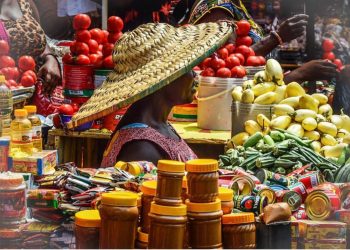- drives nearly 850,000 below the poverty line in 2022
Rising inflation rates in the country have led to serious food insecurity and poverty, with nearly 850,000 Ghanaians pushed below the poverty line in 2022 due to rising prices and a loss of purchasing power, says a report by the World Bank.
The report, titled ‘Price Surge: Unravelling Inflation’s Toll on Poverty and Food Security’, highlights how a combination of internal and external factors such as currency depreciation, rising inflation rates and financial instability have led to macroeconomic challenges in the country, with a ripple-effect on poverty and food insecurity.
Consumer inflation ended 2022 at 54.1 percent year-on-year (y/y), approximately 5.41x over the Bank of Ghana’s upper policy target of 10 percent. However, in first-half 2023 inflation showed signs of easing, dropping from its peak in December 2022 to 41.2 percent in April 2023.
This downward trend was however short-lived, as the rate increased by 100 basis points in May to 42.2 percent and a further 42.50 in June 2023 – dashing any hopes of sustained easing in prices of goods, particularly food items.
Daunting economic outlook
The report also sets out a bleak outlook for the country, predicting that economic growth is expected to slow down from a projected 3.7 percent in 2022 to 1.5 percent in 2023; with the economy expected to remain sluggish at 2.8 percent in 2024 before rebounding to near potential growth by 2025.
The lack of growth will be due to high inflation rates, interest hikes and economic uncertainty, all of which will keep private consumption and investment growth below pre-pandemic levels.
“As a result of efforts to address macroeconomic instability, corrective fiscal and monetary policies are expected to influence total demand and slow down non-extractive GDP growth,” said Pierre Laporte, World Bank Country Director for Ghana, Liberia and Sierra Leone.
He added that policies aimed at stabilising and stimulating the economy had to be complemented with a focus on rebuilding the financial sector’s capital buffers and tackling sector shortfalls in the energy industry.
The report suggests that government should embark on structural reforms to boost economic growth and build economic resilience, including a focus on fully addressing the energy sector shortfalls which continue to threaten fiscal sustainability; rebuilding the financial sector’s capital buffers to promote stability; and boosting inflows of FDI by enhancing the investment climate.
Other recommendations include measures aimed at improving revenue administration, streamlining tax incentive regimes, implementing tighter expenditure controls, and reducing market distortions such as subsidies, taxes and price controls.
The report also urged the country to draw lessons from a recent World Bank report on climate change adaptability, to prioritise investments that maximise resilience benefits at an affordable cost.
Kwabena Gyan Kwakye, World Bank Economist and co-author of the report, said the next two years will be very tricky for Ghana’s poverty reduction efforts. “Without bringing the economy back on track, no meaningful poverty reduction can happen. Concurrently, safety nets to protect the most vulnerable need to be enhanced to ensure sustainable poverty reduction and shared prosperity”.
The report also highlights the need for policies that enable farmers to adjust to global demand and take advantage of market opportunities to mitigate the impact of inflation on food security in the longer-term.
“This is particularly relevant since many of the poor are farming households, and policies should therefore be evidence-based and aimed at alleviating the different constraints farmers face,” said Ashwini Sebastian, Senior Agricultural Economist and co-author of the report.
Medium- to long-term policy actions may include the channeling of investments in agriculture research and technology transfers to help increase productivity, reduce production costs, and improve the quality and safety of food.
Additionally, the promotion of sustainable agriculture that is resilient to climate change can help farmers withstand future shocks and should be a priority for government.
The report notes that policies must target opening Ghana to more effective integration with global food supply chains to improve the availability and affordability of food. Programmes that seek to reduce market distortions such as subsidies, taxes and price controls can improve market efficiency and reduce food waste.
Rising inflation has serious impacts on poverty and food insecurity in Ghana, and policies to address the issues’ root-causes are needed. The World Bank report emphasises the need for a multi-pronged approach including structural reforms, investments in technology and research, and policies aimed at reducing market distortions. By prioritising economic stability and sustainable agriculture, the country can work toward reducing poverty and increasing shared prosperity.










